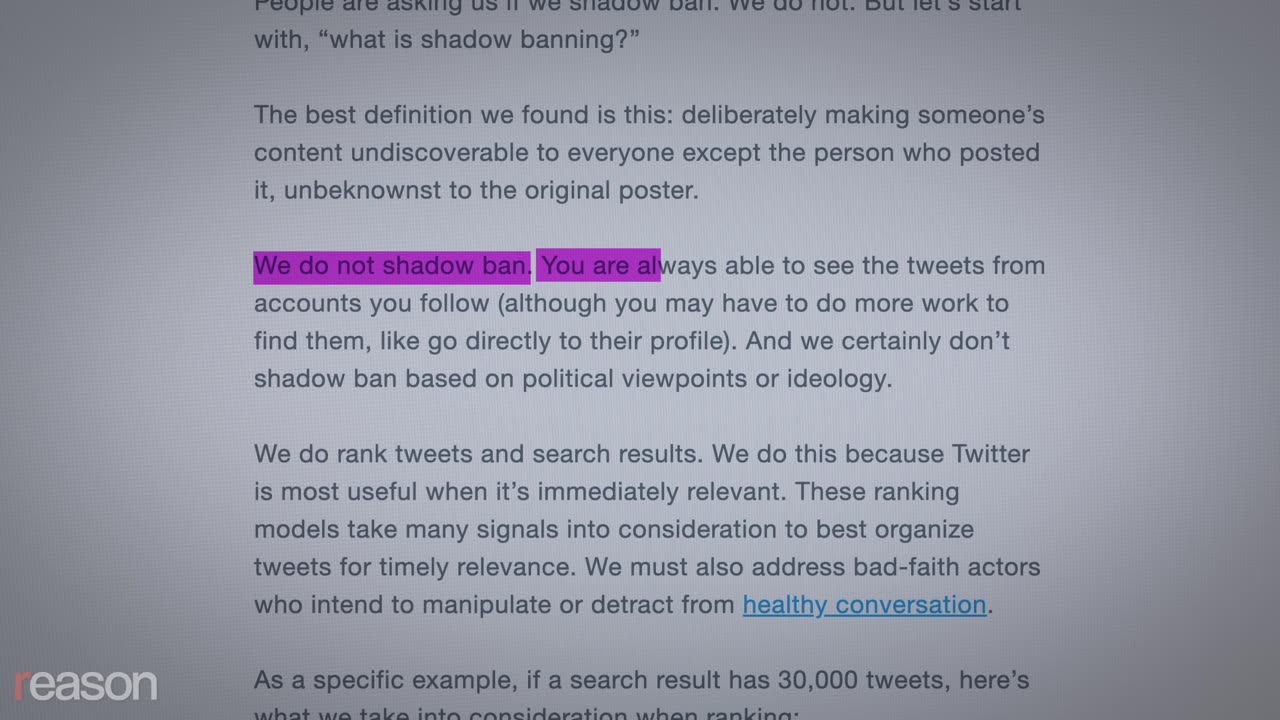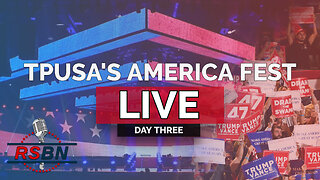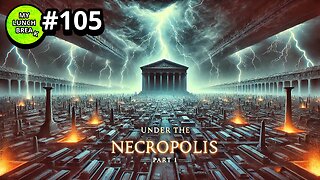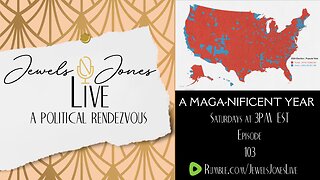Premium Only Content

Did 'every conspiracy theory' about Twitter turn out to be... true?
The internal company documents offer a behind-the-scenes glimpse at how the federal agencies distorted the public debate one of the world's largest social media platforms.
----
https://reason.com/video/2023/01/09/d...
CORRECTION: This article originally described Nostr as a "blockchain-based social media site." Nostr is an open protocol that allows users to transmit a post over a decentralized network of relays using cryptographic keys.
The so-called Twitter Files, written by a group of independent journalists given access to internal company documents, offer a behind-the-scenes glimpse at how the federal government shaped the flow of information on one of the world's largest social media platforms.
Some tech pundits say that the Twitter Files contain no secrets: they knew about the thousands of takedown requests the company receives every month from law enforcement agencies and the courts, or they had already opined about the immense challenges of content moderation. However, the Twitter Files have brought important new information to light. They show that the company stifled debate over important policy issues by shadowbanning certain accounts for no good reason and then misleading the public. They show that Twitter was routinely strongarmed by the White House and the FBI into complying with frivolous takedown requests. And they provide evidence that the intelligence community likely influenced the decision to suppress the Hunter Biden laptop story during Joe Biden's 2020 presidential campaign.
"Almost every conspiracy theory that people had about Twitter turned out to be true," Elon Musk said on the All-In Podcast in late December. "Is there a conspiracy theory about Twitter that didn't turn out to be true?"
Conspiracy theorists are often sloppy with the facts and exaggerate what actually happened. But the information brought to light by the Twitter Files should be alarming to anyone who cares about free speech and a free society. Is the government meddling similarly with YouTube, Facebook, Instagram, and Google search? How can we prevent the internet from becoming a centralized apparatus through which state actors shape and censor public debate? Here are three major takeaways from the Twitter Files:
#1 Twitter distorted the conversation and misled the public
Twitter had a system of "whitelists" that allowed its algorithms and human moderators to turn engagement dials up and down based on what a user said. It used this power to limit the ability of certain groups and individuals to reach an audience, including conservative commentator Dan Bongino, Stanford economist and medical school professor Jay Bhattacharya, mRNA vaccine critic Alex Berenson, and the Libs of TikTok account.
#2 The government is secretly policing speech.
The most troubling thing about the Berenson de-platforming isn't Twitter's decision per se, but whether it made that decision freely. Was it done at the behest of the federal government? The Twitter files provide circumstantial evidence that the White House played a role.
#3 Twitter permitted covert state propaganda on its platform.
The U.S. ran sock-puppet accounts on Twitter and then may have tried to shut them down secretly when it looked like it was caught in the act.
Produced by Zach Weissmueller; edited by Regan Taylor; sound editing by John Osterhoudt.
Photo credits: PIERRE VILLARD/SIPA/Newscom; Adrien Fillon/ZUMAPRESS/Newscom; Al Drago - Pool via CNP/SIPA/Newscom; Alisdare Hickson, CC BY-SA 4.0, via Wikimedia Commons; CelebrityHomePhotos/Newscom; Daniel Oberhaus, CC BY-SA 4.0, via Wikimedia Commons; Dominick Sokotoff/ZUMAPRESS/Newscom; Dylan Stewart/Image of Sport/Newscom; Gage Skidmore, CC BY-SA 3.0, via Wikimedia Commons; I, Aude, CC BY-SA 3.0, via Wikimedia Commons; Image of Sport/Newscom; imageBROKER/Markus Mainka/Newscom; Jarek Tuszyński / CC-BY-SA-3.0 & GDFL, CC BY-SA 3.0, via Wikimedia Commons; Kyodo/Newscom; Kris Tripplaar/Sipa USA/Newscom; Lordalpha1, CC BY 2.5, via Wikimedia Commons; LiPo Ching/TNS/Newscom; Michael Ho Wai Lee/ZUMAPRESS/Newscom ;Ministério Das Comunicações, CC BY 2.0, via Wikimedia Commons; New Media Daysderivative work: -- Cirt, CC BY-SA 2.0, via Wikimedia Commons; Oliver Contreras - Pool via CNP/picture alliance / Consolidated News Photos/Newscom; Paul E Boucher/ZUMA Press/Newscom; picture alliance / Frank Duenzl/Newscom; Ron Sachs/picture alliance / Consolidated News Photos/Newscom; Ser Amantio di Nicolao, CC BY 3.0, via Wikimedia Commons; Tesla Owners Club Belgium, CC BY 2.0, via Wikimedia Commons; Tom Williams/CQ Roll Call/Newscom; Whoisjohngalt, CC BY-SA 4.0, via Wikimedia Commons; Yichuan Cao/Sipa USA/Newscom; ZUMAPRESS/Newscom
Music Credits: "Fleeting Wave," by Palm Blue via Artlist; "Quiet Pull," by Tamuz Dekel via Artlist; "Ripples," Tamuz Dekel via Artlist; "Particles," by Nobou via Artlist; "From Above," by Dan Mayo via Artlist
-
 6:29
6:29
BIG NEM
16 hours agoCultivating God Mode: Ancient Taoist NoFap Practices
761 -
 30:53
30:53
Uncommon Sense In Current Times
1 day ago $0.02 earned"Pardon or Peril? How Biden’s Clemency Actions Could Backfire"
8.35K -
 40:01
40:01
CarlCrusher
14 hours agoSkinwalker Encounters in the Haunted Canyons of Magic Mesa - ep 4
3502 -
 59:44
59:44
PMG
1 day ago $0.16 earned"BETRAYAL - Johnson's New Spending Bill EXPANDS COVID Plandemic Powers"
22.1K -
 6:48:50
6:48:50
Akademiks
12 hours agoKendrick Lamar and SZA disses Drake and BIG AK? HOLD UP! Diddy, Durk, JayZ update. Travis Hunter RUN
141K22 -
 11:45:14
11:45:14
Right Side Broadcasting Network
9 days agoLIVE REPLAY: TPUSA's America Fest Conference: Day Three - 12/21/24
321K28 -
 12:19
12:19
Tundra Tactical
12 hours ago $11.79 earnedDaniel Penny Beats Charges in NYC Subway Killing
49.1K10 -
 29:53
29:53
MYLUNCHBREAK CHANNEL PAGE
1 day agoUnder The Necropolis - Pt 1
141K51 -
 2:00:10
2:00:10
Bare Knuckle Fighting Championship
3 days agoCountdown to BKFC on DAZN HOLLYWOOD & FREE LIVE FIGHTS!
51.6K3 -
 2:53:01
2:53:01
Jewels Jones Live ®
1 day agoA MAGA-NIFICENT YEAR | A Political Rendezvous - Ep. 103
138K36